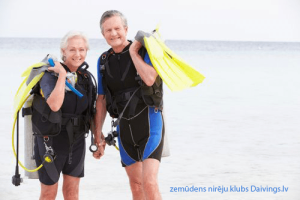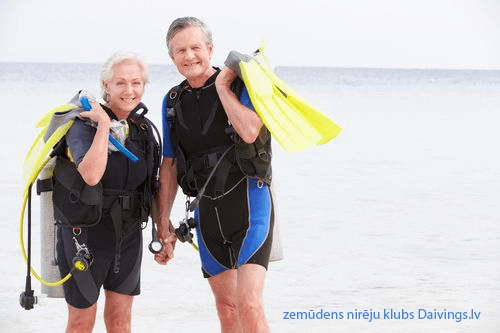"There is no age limit for diving training, diving club" Diving "training"Open Water Diver”The course has been completed by several 70-year-olds. Many families with children come, and grandfathers with grandsons also come to training, so that everyone can do this exciting sport together, ”confirms Valters Preimanis, the Latvian PADI diving instructor.
Scuba diving and life expectancy are likely to be prolonged, studies show. A study of 2,872 Danish twin couples found that only about 25 percent of life expectancy was genetic; the remaining 75 percent may be related to lifestyle factors.
Table of Contents
There are places in the world where people live longer
A team of researchers visited five sites to find out what lifestyle factors could explain this remarkable longevity; while there, they interviewed 263 centenarians. They found the following common factors: an active lifestyle, the use of stress reduction mechanisms, a sense of purpose and belonging to the right tribe (a group of people with similar interests).
In addition to the factors that are prevalent among the world's oldest population, many other factors can increase our life expectancy by a few years. For example, in 2013, the American Heart Association published a statement that keeping a dog is likely to reduce the risk of cardiovascular disease. All of these studies have led us to wonder how scuba diving affects life expectancy. We found out the answers from the experts.
Diving burns a lot more calories than many people think
It is a very calm type of exercise, but it is still an exercise. Given the diverse population of divers, do you think this type of cardiovascular exercise could be moderately beneficial to divers, or could additional cardiovascular stress be potentially harmful?
Diving is associated with environmental factors that affect the cardiovascular system, and as long as the total amount of physiological stress is limited and the diver is in good enough shape, the data do not suggest that diving is harmful to the cardiovascular system. In addition to the health-promoting effects of physical activity, it is thought that diving could have additional benefits for the heart. It has been known for some time that breathing large amounts of oxygen activates an important type of protein known as molecular chaperone (sometimes referred to as heat shock proteins for historical reasons). Some of these molecular chaperones directly protect the heart from injury; For this reason, patients are sometimes given extra oxygen before heart surgery.

Scuba diving can be a fantastic way to burn calories, as recreational diving burns around 300 to 600 calories per hour, depending on temperature and activity levels. Although most recreational diving can be very relaxing, while including increased activity and low joint tension, which is beneficial to an individual's health, some types of diving can be tiring and can put an individual with predisposing conditions at potential risk of injury or incident. It is important to remember that physical fitness is a key factor in determining the potential risk of any type of increased physical activity, so the risk associated with increased activity will largely depend on the general physical condition of the diver.
Choosing a healthy lifestyle, careful diving between them, is likely to reduce the incidence of disease in the long run. By choosing activities that you enjoy, life becomes more interesting, regardless of whether it is longer.
The various external factors listed, including alcohol consumption, sleep quality, environmental exposure, fitness and nutrition, will have different effects on long-term health and well-being. Genetics will also play a role in the interaction of these factors and ultimately affect the health of the diver. It is difficult to generalize divers and divers. A person who does not dive may be active in another way that has positive factors influencing his or her overall lifestyle. However, a healthy diver who is relatively active, does not smoke and follows a balanced diet has a lower risk of developing certain diseases and injuries that may impair other people's quality of life or overall life expectancy.
Is it possible that ordinary divers are more resilient to other environmental stresses as they dive? What about more resistance to diseases like cancer?
Diving exposures, in addition to other exposures such as exercises, can be a prerequisite for protecting individuals in future dives. It has been suggested that this preconditioning could also increase persistence in other extreme environmental conditions, such as hypoxia or environmental stressors that affect the immune system.
Yes, there is genetic evidence that regular divers may develop persistence. Together with Croatian researchers, we compared experienced technical divers with divers a few years ago. We found that there were specific changes in the genetic activity of divers' blood cells compared to divers, and that these changes could offset the negative effects of oxidative stress.
How could the risk of accidental drowning affect the average life expectancy of divers?
Statistics show that diving is a very safe recreational sport. Two out of one million. Although drowning is a risk that should not be taken lightly, I believe that the overall health benefits of physical exercise, including diving, are likely to affect the life expectancy of divers as a group.
Given the extremely low mortality rate in recreational diving, I do not believe that the risk of accidental drowning will have a significant impact on the average life expectancy of divers in general. Divers can further reduce the risk of accidental drowning or other diving accidents, while following safe diving practices.
Where in Latvia can you go scuba diving?
If you are looking for advice or help, contact and visit the Diving Club, write or call the PADI Diving Instructor at t.220-77-202 to find the right help and go scuba diving.

